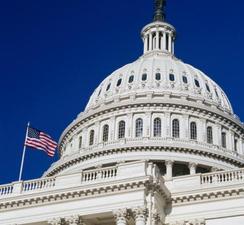






Poker Bill Passes Out of Committee -- Now What?Poker Advocates Celebrate Rare, Significant Political Victory |
|
|

The result was hailed by poker advocates as a historic vote in the battle to explicitly legalize and completely open up the markets for internet gaming. The last time an internet gaming bill went to the committee for a vote was in 2008, when the legislation failed to garner enough support by virtue of a 32-32 tie.
Many industry officials were quick to declare the passage of the bill out of committee as a major victory for the poker industry, and indeed the vote does represent a significant hurdle that has been overcome. However, for those people who expect the laws to change in a matter of days or weeks, they will likely be disappointed.
In a news article reporting the vote, the New York Times noted how the legislation was “far from becoming law” — citing the little time remaining on the legislative calendar before midterm elections, the fact that Senator Robert Menendez (D-NJ) had yet to hold a hearing on his equivalent legislation, and the Obama administration’s failure to identify its public position on the issue.
However, for an industry that has been focused on the House Financial Services Committee for so long, Wednesday’s vote could not have been more welcomed.
“The Committee’s bi-partisan vote to approve Chairman Frank’s legislation is nothing short of historic,” offered Michael Waxman, a spokesperson for the Safe and Secure Gambling Initiative.
Alfonse D’Amato, a former U.S. Senator and the chairman of the Poker Players Alliance, commended the legislators who voted in support of the legislation.
“I’m glad the Financial Services Committee today overwhelmingly chose to act and protect Americans, as well as preserve the fundamental freedoms of adults and the Internet,” said D’Amato. “This is a great day not only for poker players, but for proponents of Internet freedom and individual liberty.”
However, the PPA acknowledged the job was far from complete, urging poker players to continue to speak up on various political forums, including the Obama administration’s change.gov Citizen’s Briefing Book website, as well as the Republican’s America Speaking Out website.

Wednesday’s mark-up and vote was not without its share of drama, as several last-minute amendments were added to the legislation. Amongst them was the prohibition of using credit cards to deposit onto sites, increasing the amount of time for states to be able to opt out of the legislation from 90 days to a full legislative session, requiring that technology be in place for loss limits, and banning sites who broke existing federal laws from being able to get a license under the new system.
That last amendment worried many online poker players, who wondered if the current U.S.-friendly sites that offer the game would now be banned if this legislation ever became law. Several sites, like PartyPoker, pulled out of the U.S. market after the UIGEA was passed in 2006. Other sites, like PokerStars and Full Tilt, stayed in the market, claiming they were breaking no laws by doing so. The UIGEA is in essence a banking law, and did not expand gambling in the states.
Click here to see a full list of the amendments proposed on Rep. Frank’s legislation.
In response to consumer concern, PokerStars released a statement that said it supported the legislation and the new amendment.
“The UIGEA, by its clear terms, shall not be construed as ‘altering, limiting or extending any Federal or State law or Tribal-State compact prohibiting, permitting, or regulating gambling within the United States,’” the statement read. “PokerStars supports the provisions in both [applicable] amendments as neither would adversely affect the availability of a license for a respected operator such as PokerStars. As reflected in legal opinions provided to PokerStars, its activities in the US are and at all times have been lawful.”
PokerStars also cited its success in working with various international governments, including that of France and Italy.
The Ways & Means Committee is about to go on a legislative break along with the rest of the House of Representatives, so the earliest that McDermott’s bill can be discussed will be in September.
